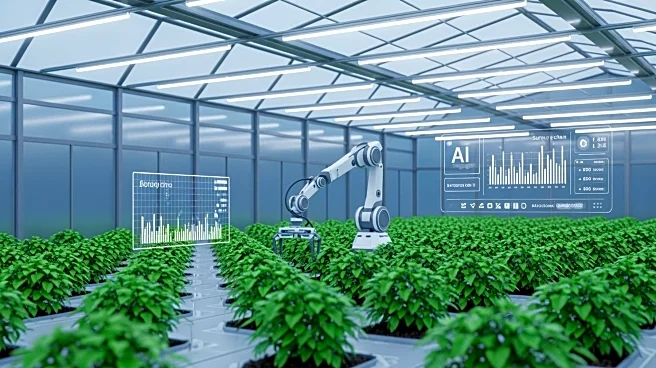What's Happening?
PepsiCo and Walmart are leveraging artificial intelligence (AI) to enhance their agrifood supply chains in response to climate change and geopolitical tensions. PepsiCo has partnered with Cropin to develop Lay’s Smart Farm, an AI platform providing comprehensive
visibility into potato sourcing and supply chains. This initiative aims to address the challenges posed by climate change, which disrupts traditional farming practices in the Asia-Pacific region. Similarly, Walmart is using AI solutions to mitigate risks related to weather and market volatility, streamlining sourcing practices and improving yield predictions. These efforts are part of a broader trend where agrifood companies are reimagining production and sourcing strategies to build resilient and sustainable systems.
Why It's Important?
The integration of AI in agrifood supply chains is crucial for companies like PepsiCo and Walmart to navigate the complexities of modern agriculture. Climate change and geopolitical factors have made traditional sourcing methods obsolete, necessitating innovative approaches to ensure supply chain resilience. By employing AI, these companies can gain real-time insights into crop conditions, optimize resource use, and predict market shifts, ultimately reducing risks and enhancing sustainability. This technological shift not only supports corporate sustainability goals but also offers economic benefits by potentially saving millions through improved efficiency and reduced waste.
What's Next?
As AI continues to transform agrifood supply chains, companies are likely to expand their use of technology to other areas of agriculture. The success of initiatives like Lay’s Smart Farm could encourage further investment in AI-driven solutions, promoting wider adoption across the industry. Additionally, the focus on sustainability and resilience may lead to increased collaboration between agrifood companies and technology providers, fostering innovation and driving the development of new tools and platforms. Stakeholders, including farmers and investors, may also play a significant role in shaping the future of AI in agriculture, as they seek to balance profitability with environmental responsibility.
Beyond the Headlines
The adoption of AI in agriculture raises important ethical and cultural considerations. While technology offers significant benefits, it also poses challenges related to data privacy, farmer autonomy, and the digital divide. Ensuring equitable access to AI tools and addressing potential biases in data and algorithms will be critical to achieving inclusive and sustainable agricultural practices. Moreover, the shift towards AI-driven agriculture may necessitate changes in regulatory frameworks and industry standards to safeguard against potential risks and ensure that technological advancements align with societal values.















